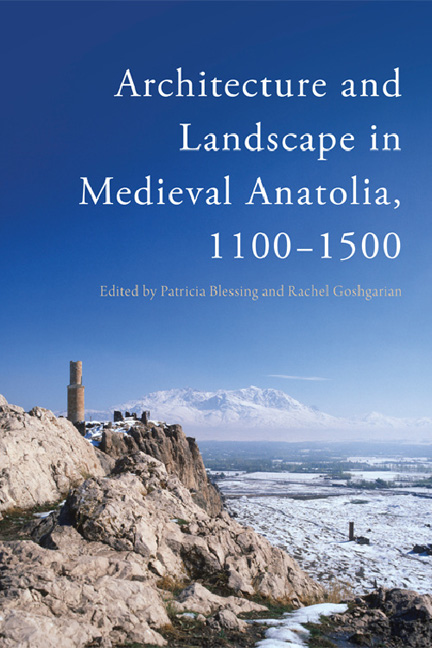Book contents
- Frontmatter
- Contents
- List of Illustrations and Tables
- Acknowledgements
- Foreword
- Map
- 1 Introduction – Space and Place: Applications to Medieval Anatolia
- Part I Building: Masons and Infrastructure
- Part II Social Groups: Akhis and Futuwwa
- Part III Exchange: Islamic and Christian Architecture
- Part IV Frameworks: Language, Geography and Identity
- 8 Harvesting Garden Semantics in Late Medieval Anatolia
- 9 All Quiet on the Eastern Frontier? The Contemporaries of Early Ottoman Architecture in Eastern Anatolia
- 10 The ‘Dual Identity’ of Mahperi Khatun: Piety, Patronage and Marriage across Frontiers in Seljuk Anatolia
- Notes on Contributors
- Bibliography
- Index
8 - Harvesting Garden Semantics in Late Medieval Anatolia
from Part IV - Frameworks: Language, Geography and Identity
Published online by Cambridge University Press: 03 January 2018
- Frontmatter
- Contents
- List of Illustrations and Tables
- Acknowledgements
- Foreword
- Map
- 1 Introduction – Space and Place: Applications to Medieval Anatolia
- Part I Building: Masons and Infrastructure
- Part II Social Groups: Akhis and Futuwwa
- Part III Exchange: Islamic and Christian Architecture
- Part IV Frameworks: Language, Geography and Identity
- 8 Harvesting Garden Semantics in Late Medieval Anatolia
- 9 All Quiet on the Eastern Frontier? The Contemporaries of Early Ottoman Architecture in Eastern Anatolia
- 10 The ‘Dual Identity’ of Mahperi Khatun: Piety, Patronage and Marriage across Frontiers in Seljuk Anatolia
- Notes on Contributors
- Bibliography
- Index
Summary
It sometimes seems like discussions of political history are the only fruits that grow in the field of late medieval Anatolian historiography, and that this ground is simply not fertile enough for the cultivation of social history. It is true that fourteenth-century Anatolia did not leave us with the wealth of archival documents that characterises later Ottoman history. Yet while some naively await the unearthing of new sources, other fields have proven over and over again that new questions, rather than new source material, are the best tools for historiographical development.
This chapter, just like many other contributions to this volume, seeks to expand the range of questions one can raise in relation to late medieval Anatolian history by showing that extant sources do carry more information than a cursory look would suggest. The range of topics these sources allow us to investigate is almost unlimited, but gardens, and garden-related vocabulary in particular, are ideally suited to showcase this untapped potential for a number of reasons. For one, there exists a manageable variety of terms (adEqa, junayna, bagh/bag, baghcha/bagce, bEstan/bostan) that present a good example of the wealth of nuances hidden between words otherwise indiscriminately translated into English as ‘garden’. Furthermore, the same set of terms is used in Turkish- and Persianlanguage sources, while a separate set appears in Arabic-language ones, allowing us to investigate the nature of the porosity of boundaries between the three written languages that Muslim authors of that period used in different circumstances.
While Anatolia did not have any significant Arab population, the Arabic language remained the language of Islamic law, which was the primary legal framework of the region. For this reason, Arabic was the language used in documents related to real estate ownership, including some that describe gardens. Politically and culturally, Anatolia was still dominated by a Persian-speaking elite that had established itself in the region in connection to the Seljuk court culture. This elite, which included the famous poet Jalal al-Din Rumi, was actively engaging with the vibrant Persian literary tradition (in which gardens often appear) and spoke the language in their daily life, including in their interactions with gardens as places of entertainment and as agricultural investments.
- Type
- Chapter
- Information
- Architecture and Landscape in Medieval Anatolia, 1100-1500 , pp. 185 - 199Publisher: Edinburgh University PressPrint publication year: 2017



